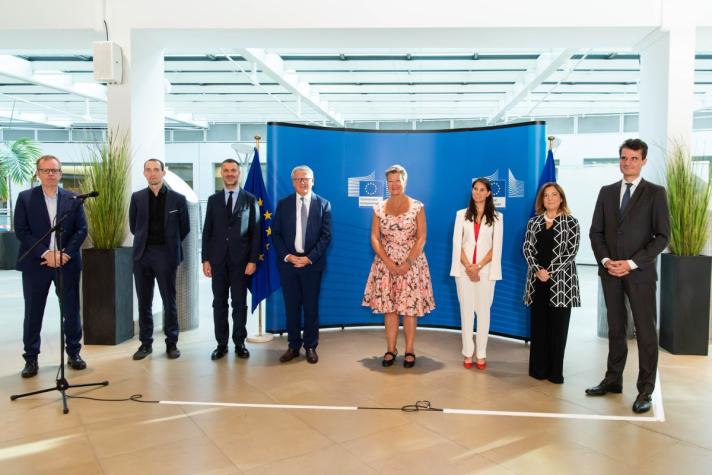On 19 December 2022, Commissioner for Home Affairs, Ylva Johansson, and Commissioner for Jobs and Social Rights, Nicolas Schmit, met with representatives of European Social and Economic Partner organisations (ETUC, BusinessEurope, SGI Europe, SMEUnited, Eurochambres) to reaffirm their commitment to the European Partnership for Integration. In the resulting joint statement, the members of the Partnership are placing particular focus on leveraging the Partnership to support people fleeing Russia’s illegal and unprovoked invasion of Ukraine with their integration into the EU labour market. The members of the Partnership will also look at contributions towards making the assessment, recognition and validation of skills and qualifications of refugees and migrants easier and more straight-forward. The Commission published a press release with statements from Commissioners Johansson and Schmit.
Reinforcing cooperation between labour market actors is a key priority of the European Commission’s Action Plan on Integration and Inclusion 2021-27. The main asset of the European Partnership for Integration is its multi-stakeholder approach, which links up partners from the European to the national, regional and local levels. Since its launch, the Economic and Social Partners have implemented a wide range of actions in the field of integration in more than 20 EU countries. The European Commission has co-funded several innovative projects bringing together employers, chambers of industry and commerce, trade unions and migrant associations to help refugees and other migrants integrate into the labour market.
You can find examples of actions undertaken in the field of integration in the labour market by national economic and social partner organisations since 2017.
Background
The Commission closely cooperates with social and economic partners as well as employers on labour market integration since 2016. On 20 December 2017, the European Commission and European social and economic partners signed the European Partnership for Integration (PDF) to work more closely together in order to foster the integration of refugees in the labour market. The Partnership lays down key principles for the integration of refugees into the labour market, including providing support as early as possible, ensuring that integration benefits refugees and the economy and society at large and ensuring a multi-stakeholder approach, as well as commitments to put these principles into practice.
- Press statement "Integration of refugees: Commission joins forces with social and economic partners"
On 3 March 2020, Commissioner for Home Affairs Ylva Johansson met with Economic and Social Partners in the context of the consultations on the Pact on Asylum and Migration.
On 5 May 2020, Commissioner Johansson and Economic and Social Partners met to discuss the role of migration and integration in the recovery phase following the COVID-19 crisis. Following this meeting, Commissioner Johansson issued a press statement stressing her intention to renew the Partnership and continue the cooperation with Economic and Social Partners organisations.
On 7 September 2020, Commissioners Johansson and Schmit and representatives of the five Social and Economic Partners organisations (ETUC, Business Europe, SMEUnited, CEEP, Eurochambres) renewed their commitment to the European Partnership for Integration through a joint statement (PDF). The respective press release published by the Commission includes statements by Commissioners Johansson and Schmit.


